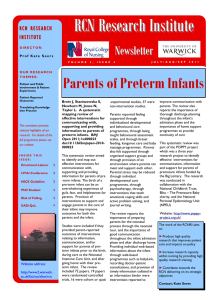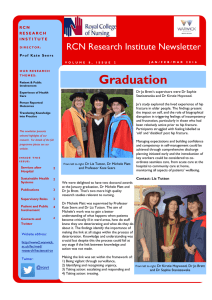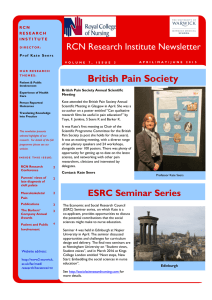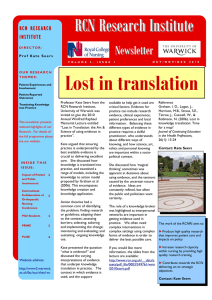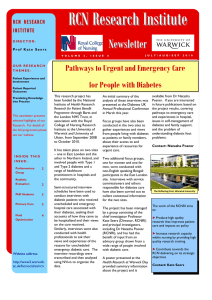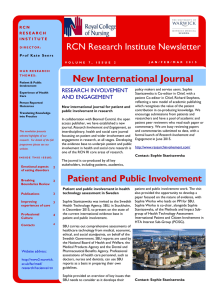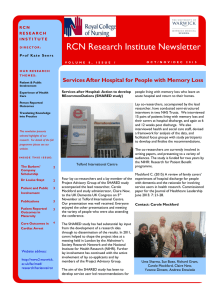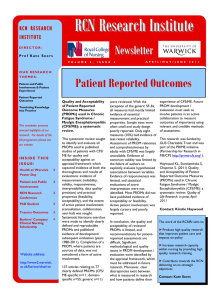RCN Research Institute Newsletter New NICE Guidance
advertisement
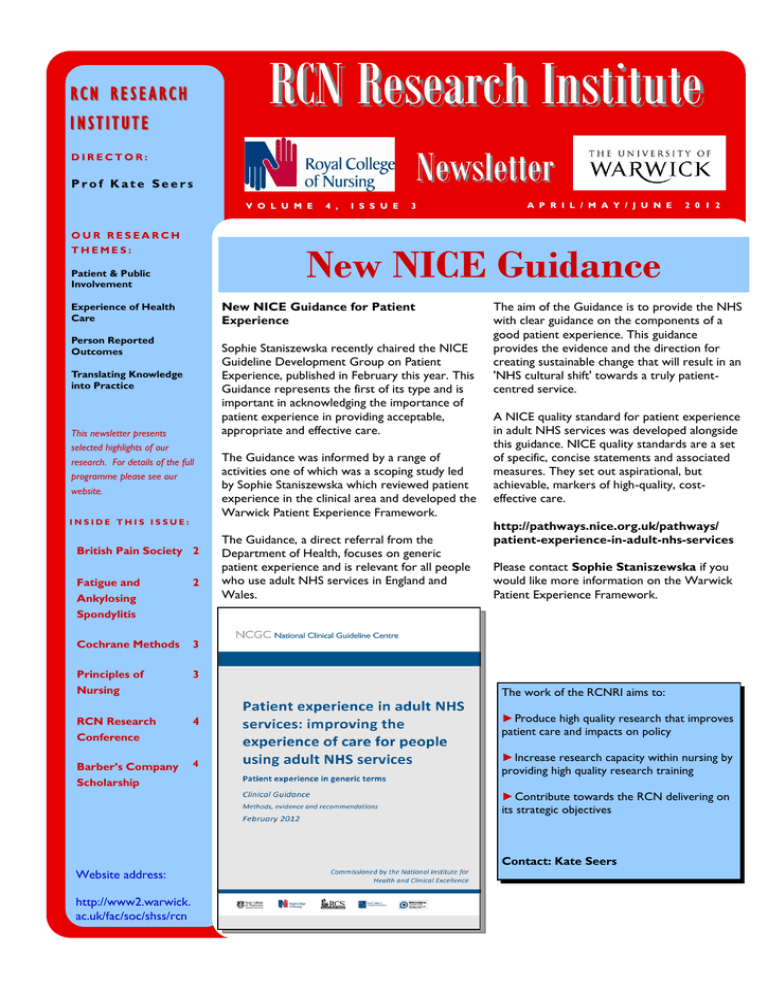
RCN Research Institute RCN RESEARCH INSTITUTE Newsletter DIRECTOR: Prof Kate Seers V O L U M E OUR RESEARCH THEMES: 4 , I S S U E 3 A P R I L / M A Y / J U N E 2 0 1 2 New NICE Guidance Patient & Public Involvement New NICE Guidance for Patient Experience Experience of Health Care Person Reported Outcomes Translating Knowledge into Practice This newsletter presents selected highlights of our research. For details of the full programme please see our website. INSIDE THIS ISSUE: British Pain Society 2 Sophie Staniszewska recently chaired the NICE Guideline Development Group on Patient Experience, published in February this year. This Guidance represents the first of its type and is important in acknowledging the importance of patient experience in providing acceptable, appropriate and effective care. The Guidance was informed by a range of activities one of which was a scoping study led by Sophie Staniszewska which reviewed patient experience in the clinical area and developed the Warwick Patient Experience Framework. The Guidance, a direct referral from the Department of Health, focuses on generic patient experience and is relevant for all people who use adult NHS services in England and Wales. The aim of the Guidance is to provide the NHS with clear guidance on the components of a good patient experience. This guidance provides the evidence and the direction for creating sustainable change that will result in an 'NHS cultural shift' towards a truly patientcentred service. A NICE quality standard for patient experience in adult NHS services was developed alongside this guidance. NICE quality standards are a set of specific, concise statements and associated measures. They set out aspirational, but achievable, markers of high-quality, costeffective care. http://pathways.nice.org.uk/pathways/ patient-experience-in-adult-nhs-services Please contact Sophie Staniszewska if you would like more information on the Warwick Patient Experience Framework. Fatigue and Ankylosing Spondylitis 2 Cochrane Methods 3 Principles of Nursing 3 RCN Research Conference 4 ► Produce high quality research that improves patient care and impacts on policy Barber’s Company Scholarship 4 ► Increase research capacity within nursing by providing high quality research training The work of the RCNRI aims to: ► Contribute towards the RCN delivering on its strategic objectives Website address: http://www2.warwick. ac.uk/fac/soc/shss/rcn Contact: Kate Seers PAGE 2 British Pain Society Poster wins a “Top 5 Best Presented Poster” slot at the British Pain Society Annual Scientific Meeting. Kate Seers and Fran Toye (from the Nuffield Orthopaedic Centre in Oxford) and colleagues presented a poster at The British Pain Society on “How do we know which qualitative research study is good enough to contribute to a meta-ethnography (evidencesynthesis) of chronic musculoskeletal pain?” They showed that checklists do not produce consistent judgements when assessing qualitative research, but they are testing whether higher scoring papers will make a more meaningful contribution to the meta-ethnography. This poster is based on a National Institute of Health funded meta-ethnography (systematic review of qualitative research evidence) on chronic musculoskeletal pain. This study will be completed in November this year, and will feature in a future newsletter. Prof Kate Seers Fatigue and Ankylosing Spondylitis Fatigue and Ankylosing Spondylitis (AS): the importance of assessing frequency and severity. Reference: Haywood KL, Packham JC, Jordan KP. (2012) Assessing Fatigue in Ankylosing Spondylitis (AS): the importance of frequency and severity. British Society of Rheumatology, Spring Conference, Abstract 101. RCN Participants in a UK-wide survey completed a questionnaire containing AS-specific and generic measures at baseline and 6 months [2]. Single-items taken from the EASi-QoL [2] and the BASDAI [1] were used to measure fatigue frequency and severity, respectively. A successful collaboration between the RCNRI, the Arthritis Research UK Primary Care Centre at Keele University, and the Staffordshire Rheumatology Centre, led by Kirstie Haywood, Senior Research Fellow at the RCNRI has provided guidance to improve fatigue assessment in patients with Ankylosing Spondylitis (AS). Respondents were grouped according to score cut-off points to reflect: no fatigue, frequent not severe, severe not frequent, or frequent and severe fatigue. Up to 74% of baseline responders experienced fatigue (n=451/611). Of these, 75% reported frequent and severe, 15% frequent not severe, and 10% severe not frequent fatigue. There was no difference between groups on gender, age, or years with AS. Dr Haywood presented the results of a study exploring the value of assessing fatigue frequency, and its relationship with fatigue severity at the British Society of Rheumatology’s Spring Conference held in Glasgow at the beginning of May 2012. As hypothesised, patients reporting frequent and severe fatigue had worse scores than other groups across all AS-specific and generic PROMs. However, patients reporting only frequent fatigue had similar scores to those reporting only severe fatigue but RESEARCH INSTITUTE worse than those without fatigue. At the 6-month follow-up, the majority (81%) of non-fatigued patients and those with frequent and severe fatigue (79%) at baseline did not change their fatigue level. However, the majority of patients with frequent or severe fatigue at baseline changed (80%), mainly to no fatigue (43%) or to both frequent and severe fatigue (30%). The results of this study suggest that routinely assessing both frequency and severity of fatigue are important in understanding the impact of fatigue and its change over time. Not assessing frequency could result in the failure to identify patients with significant fatigue. However, the multi-dimensional nature of fatigue should be further explored in AS to identify the most appropriate and acceptable method of assessment. Contact: Kirstie Haywood VOLUME 4, ISSUE PAGE 3 Cochrane Methods In March, Jackie Chandler visited the RCNRI to present a seminar on her work as Methods Co-ordinator at the Cochrane Collaboration. 3 The RCN Research Institute, within the School of Health and Social Studies, at the University of Warwick, provides a vibrant student research community. If you are interested in undertaking a PhD, part time or full time, please contact: Prof Kate Seers. Left to right: Kirstie Haywood, Carole Mockford, Sophie Staniszewska, Jackie Chandler, Kate Seers, Jo Brett, Liz Tutton Principles of Nursing Practice RCN West Midlands Event “Principles of Nursing Practice” Sophie Staniszewska presented the NICE Guidance on Patient Experience at an RCN West Midlands Regional event which focused on the RCN Principles of Nursing Practice. Sophie presented the NICE Patient Experience Guidance and mapped it across to the key themes within the RCN Principles of Nursing Practice. Key areas of overlap were identified and participants considered how the RCN Principles of Nursing Practice and the NICE Guidance can inform their own practice. The RCN President, Andrea Spyropoulos, attended the event and the participants generated a wide range of discussions about high quality care. Contact: Sophie Staniszewska Left to right: Yvonne Sawbridge, Linda Watterson, Andrea Spyropoulos, Jenny Gordon, Alison Warren, Paul Vaughan, Sophie Staniszewska RCN RESEARCH INSTITUTE PAGE 4 RCN Research Conference 2012 The RCN 2012 International Research conference was held in London this year. Seven staff from the RCN Research Unit attended and presented papers on their on-going research. The papers were: How well are we measuring patient-centred outcomes following traumatic hip fracture? A systematic review of patient-reported outcome measures (PROMS) by Kirstie Haywood; The HipEx studyPatient experiences of hip fracture: a systematic review of qualitative evidence by Jo Brett; The role of family members in diabetes self-care and diabetic crises by Lee Gunn; The GRIPP 2 checklist: enhancing the quality and transparency of patient and public involvement reporting by Sophie Staniszewska; Methodological issues of research with frail older people by Liz Tutton. Contact: Liz Tutton Left to right: Dr Liz Tutton, Dr Sophie Staniszewska Barbers’ Company Scholarship 2012 The 2012 awards for the Barbers’ Company Clinical Nursing Scholarship were made on 2nd May. Six out of 83 applicants were awarded funding for the next academic year to cover their fees and subsistence whilst undertaking their studies or research. The scholarship is specifically intended for nurses in, or planning to return to, clinical practice. The Scholarship funding of £7,500 is awarded annually by the Worshipful Company of Barbers, one of the City of London’s ancient livery companies. Contact: Paul Kent Left to right: Dr Jeremy Bolton, Prof Kate Seers, Prof Claire Hale RCN Research Institute School of Health and Social Studies University of Warwick RCNRI Staff and Email Contacts: COVENTRY Jo Brett j.brett@warwick.ac.uk CV4 7AL Lee Gunn kathleen.gunn@warwick.ac.uk Dr Kirstie Haywood k.I.haywood@warwick.ac.uk Website Address: www2.warwick.ac.uk/fac/soc/shss/rcn RCNRI Research Team Administrator: Paul Kent Deirdre Kennedy d.r.kennedy@warwick.ac.uk Dr Carole Mockford carole.mockford@warwick.ac.uk Claire New c.e.new@warwick.ac.uk Phone: 024 761 50618 Prof Kate Seers kate.seers@warwick.ac.uk Fax: Dr Sophie Staniszewska sophie.staniszewska@warwick.ac.uk 024 761 50643 email: p.d.kent@warwick.ac.uk Dr Liz Tutton liz.tutton@warwick.ac.uk
